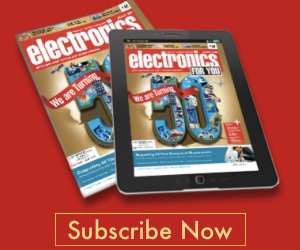INDIA, Bangalore – May 24, 2017 – NIWeek – the provider of platform-based systems that enable engineers and scientists to solve the world’s greatest engineering challenges, announced today LabVIEW NXG 1.0, the first release of the next generation of LabVIEW engineering system design software. LabVIEW NXG bridges the gap between configuration-based software and custom programming languages with an innovative new approach to measurement automation that empowers domain experts to focus on what matters most – the problem, not the tool.
“Thirty years ago, we released the original version of LabVIEW, designed to help engineers automate their measurement systems without having to learn the esoterica of traditional programming languages. LabVIEW was the ‘nonprogramming’ way to automate a measurement system,” said Jeff Kodosky, NI cofounder and business and technology fellow, known as the ‘Father of LabVIEW.’ “For a long time we focused on making additional things possible with LabVIEW, rather than furthering the goal of helping engineers automate measurements quickly and easily. Now we are squarely addressing this with the introduction of LabVIEW NXG, which we designed from the ground up to embrace a streamlined workflow. Common applications can use a simple configuration-based approach, while more complex applications can use the full open-ended graphical programming capability of the LabVIEW language, G.”
The 1.0 release of LabVIEW NXG helps engineers performing benchtop measurements drastically increase their productivity with new nonprogramming workflows to acquire and iteratively analyze measurement data. These nonprogramming workflows simplify automation by building the necessary code behind the scenes. For instance, engineers can drag and drop a section of code equivalent to 50 lines of text-based code. This is just one of the many ways LabVIEW NXG helps engineers focus on innovation rather than implementation.
“As business has increased, the NI platform has allowed our software to scale up to meet the rising demand,” said Casey Lamers, senior controls engineer at Phoenix Nuclear Labs, which provides the world’s strongest commercial neutron generators for industries such as medicine, energy and material processing. “Developing custom software for a new accelerator used for the medical imaging isotope industry has gone from taking months to weeks, and software build times have gone from hours to just 30 minutes. As a participant in NI’s lead user program, we’ve been using early versions of LabVIEW NXG over the last year and are confident it will further reduce our development time and improve our ability to deliver new features faster.”
LabVIEW NXG introduces a re-engineered editor with functionality that experienced LabVIEW users often request, but it still offers a user experience similar to complementary software in the market. The refreshed editor further extends the openness of LabVIEW to integrate with a broader set of languages. The modernized editor improves programming productivity by streamlining the editor micro-interactions, user interface objects based on vector graphics and zooming capabilities.
As LabVIEW NXG 1.0 revolutionizes benchtop measurements, new capabilities in LabVIEW 2017 target the development, deployment and management of large, complex and distributed test and embedded applications. These include features that enhance interoperability with standard IP and standard communications protocols such as IEC 61131-3, OPC UA and the secure DDS messaging standard.
Whether you are buying LabVIEW for the first time or have been on an active service contract for years, you have access to both LabVIEW NXG 1.0 and LabVIEW 2017. These two versions of LabVIEW demonstrate NI’s continued investment in the productivity of engineers developing applications that require test, measurement or control with rapid access to hardware and data insights.
As NI builds on its 30+ year investment in software, the first release in the next generation of LabVIEW is planned as the first in a series of fast-paced releases that will expand engineering capabilities from design to test. From simple DAQ applications to building complex test systems and smart machines, LabVIEW helps reduce time to market and accelerate engineering productivity.






